ATS.io compiled a list of five of the biggest upsets in Summer Olympics history using research from the IOC, Olympedia, NBC, and other news sources.
This item is available in full to subscribers.
To continue reading, you will need to either log in to your subscriber account, below, or purchase a new subscription.
Please log in to continue |
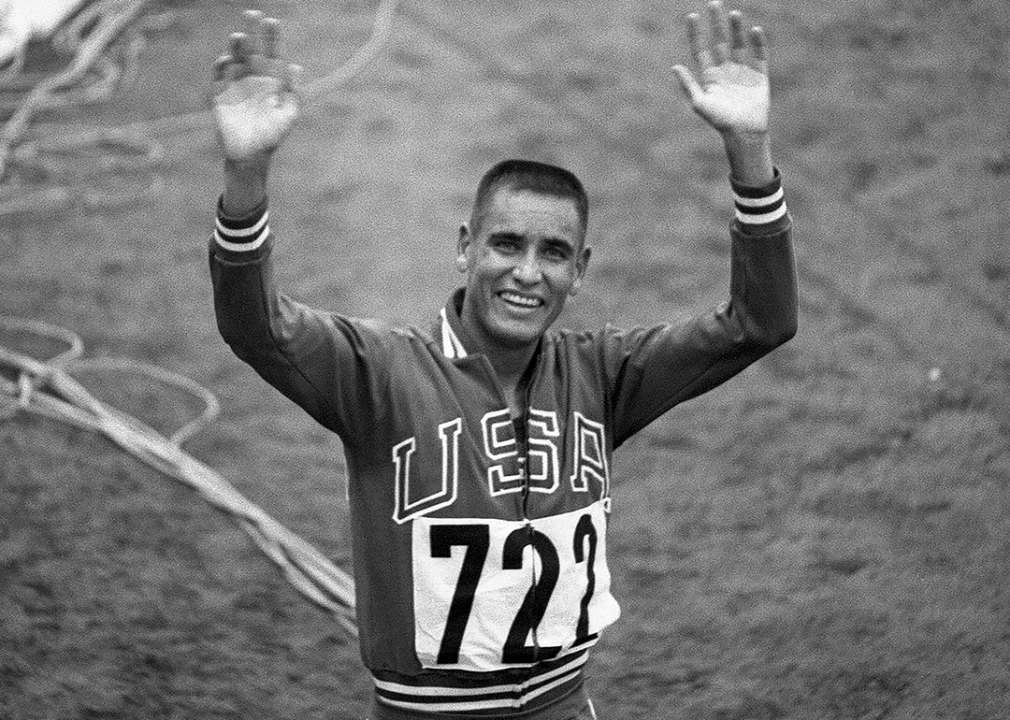
For athletes and sports fans alike, the Olympic Games are the pinnacle of sporting events. Every four years, more than 10,000 athletes from nearly every country come together for the Summer Olympics and compete in dozens of sports. With over 3 billion people watching, it's arguably the most popular sporting event in the world, showcasing sports and countries both large and small on the global stage.
Every Olympics has great competitions, but upsets are the most memorable. Underdogs take the drive and determination that got them to the Games and flip the script to take down the front-runners. ATS.io compiled a list of five of the biggest upsets in Summer Olympics history, using research from the International Olympic Committee, Olympedia, NBC, and other news sources.
Olympic upsets have happened all throughout the Games' history. The very first Olympic champion, triple jumper James Connolly, was somewhat of an underdog. Despite nearly missing his competition due to a mix-up involving Greek calendars, he ended up in the top spot due to a last-minute change in approach.
Some surprise wins come from favorites. In 1952, the great Czechoslovakian runner Emil Zátopek had won two long-distance gold medals and on a whim decided to enter the marathon—his first ever—and shocked the field by winning gold.
Other underdogs put their country on the map. Ethiopian Abebe Bikila—a surprise addition to the team—shone a spotlight on East Africa as a hotbed of talent for distance runners when he won the marathon at Rome in 1960, running barefoot.
However, not every upset story is a happy one. At the 1972 Munich Olympics, controversy erupted during the gold medal basketball match between the U.S. and the Soviet Union. The last three seconds of the game were put back on the clock twice for unclear reasons. The final time, the Soviets scored a basket to win by one. To this day, the Americans have never accepted their silver medals. Four years later, a strong U.S. women's swim team brought home just one gold, which was deemed an upset of the dominant East German team—an upper hand that years later was found to have been due to doping.
Thankfully, not every upset is shrouded in controversy. Most, like the ones on this list, captured the hearts and imaginations of millions, proving that underdogs can also achieve greatness.
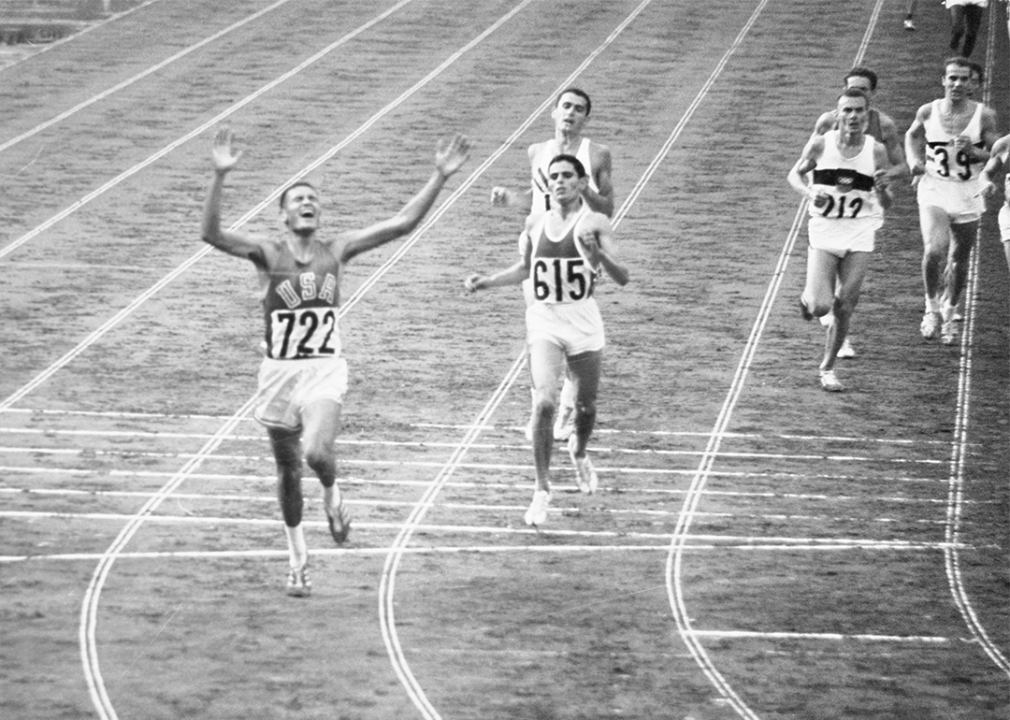
As runners lined up on the starting line for the 10,000-meter race, all eyes were on Australian world record holder Ron Clarke, who was expected to win the gold. Nobody paid any attention to American Billy Mills, whose best time in this race was nearly a minute slower. Born on the Pine Ridge Indian Reservation, Mills was a member of the Oglala Lakota Tribe and grew up in poverty. By age 12, both of his parents had died, but Mills managed to go to college on an athletic scholarship and, by the Olympics, was an officer in the Marines.
During the race, Mills hung in the mix near the front of the pack, but no one thought much of him—even the commentators on the highlight reel described Mills as "a man no one expects to win this particular event." Yet, at the halfway point, Mills was in the lead, with Clarke and Tunisian runner Mahomed Gammoudi there with him.
The trio got into traffic as they started lapping runners, which caused them to shove each other for position to make their move at the end of the race, pushing Mills out of the way. However, Mills spotted a hole on the inside of the track, took advantage of it, and sprinted to the finish line. To this day, Mills remains the first and only American to win Olympic gold at this distance.
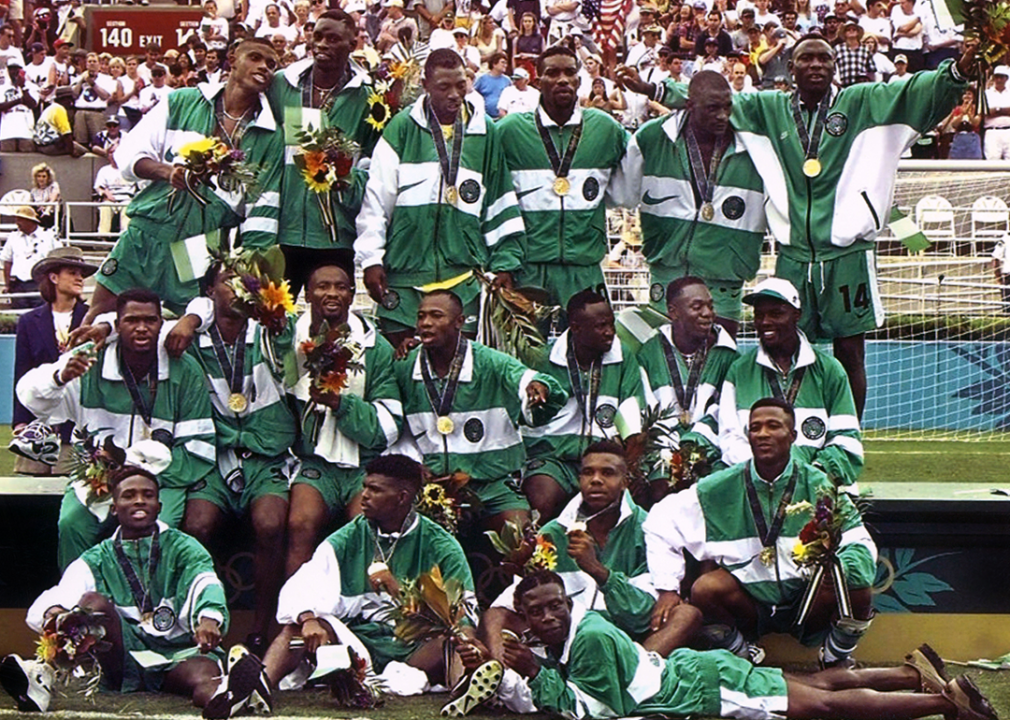
Still riding high from winning its fourth World Cup title in 1994, Brazil came into Atlanta as the pretournament favorites. They won their group, which also included the Super Eagles from Nigeria, a team with the likes of Nwankwo Kanu, Sunday Oliseh, Jay-Jay Okocha, and others.
In the group stage, Nigeria racked up two wins before losing to Brazil 1-0. Nevertheless, the Super Eagles were able to move onto the knockout stage based on goal differentials, the first time the country had gotten past the group stage. They handily beat Mexico 2-0 in the quarterfinals, then had a rematch with Brazil in the semifinals. Down 3-1 at halftime, it wasn't until the 78th minute that Nigeria put another point on the board. Kanu tied it up with just two minutes left in regulation and then scored the game-winning goal three minutes into overtime.
After the upset, Nigeria faced Argentina in the finals and fell behind almost immediately on an Argentinian goal in the second minute. The Super Eagles battled back, however, and came from behind twice to win 3-2. Known as Nigeria's "Dream Team," they were the first African nation to win a major international soccer tournament.
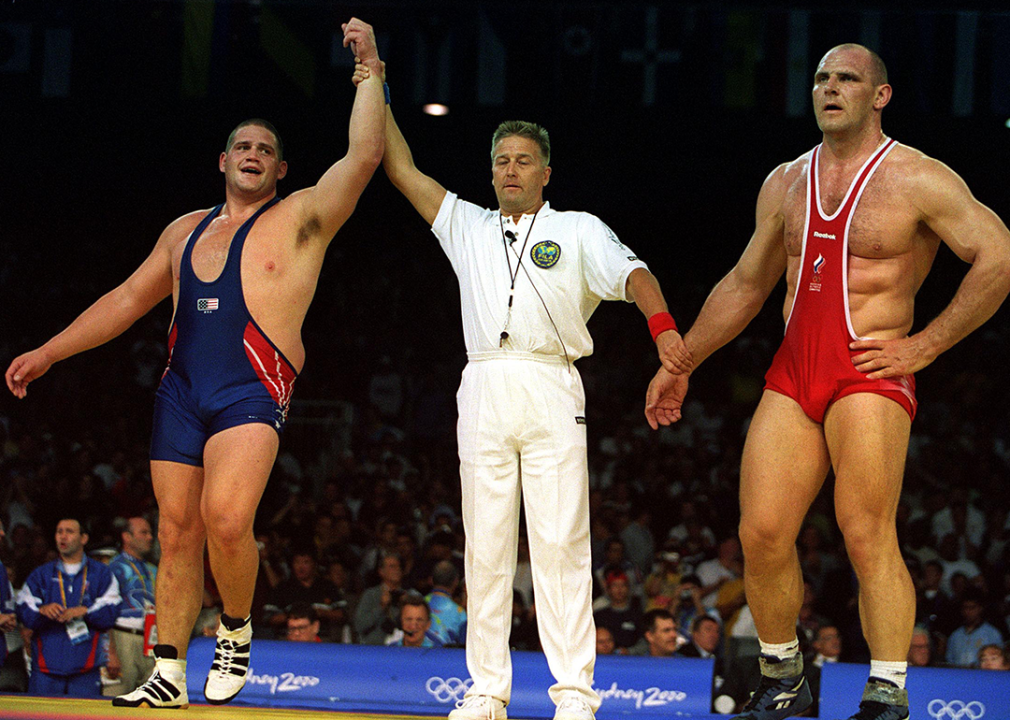
Russian Aleksandr Karelin was the heavy favorite in the super heavyweight division of the Greco-Roman wrestling tournament. A man who looked like he was chiseled out of marble, Karelin at the time had a perfect record for 13 years and was the first wrestler to ever win the gold medal three times in the same weight class. At the 2000 Sydney Games, he was vying to be the first wrestler ever to win four Olympic gold medals, and by the finals, was well on his way to the top of the podium, having ceded no points to any opponents the entire tournament.
Enter Rulon Gardner, son of a Wyoming dairy farmer. Gardner had fallen victim to Karelin at the 1997 World Championships, but at Sydney had sailed through pool play undefeated. After a close 3-2 victory in the semifinals, Gardner was set to face the Russian Bear for the gold medal. Neither man could score in the first round, but in the second round, Karelin made a mistake, losing his grip around Gardner, which gave Gardner a point—the only point of the match. Gardner held his own throughout the rest of the match, proving to be impervious to Karelin's famous reverse lift. When time ran out, and the referee declared Gardner the new Olympic champion, he celebrated by doing cartwheels on the mat.
Karelin retired after these Games, while Gardner went on to one more Olympics, winning bronze at the 2004 Athens Games.
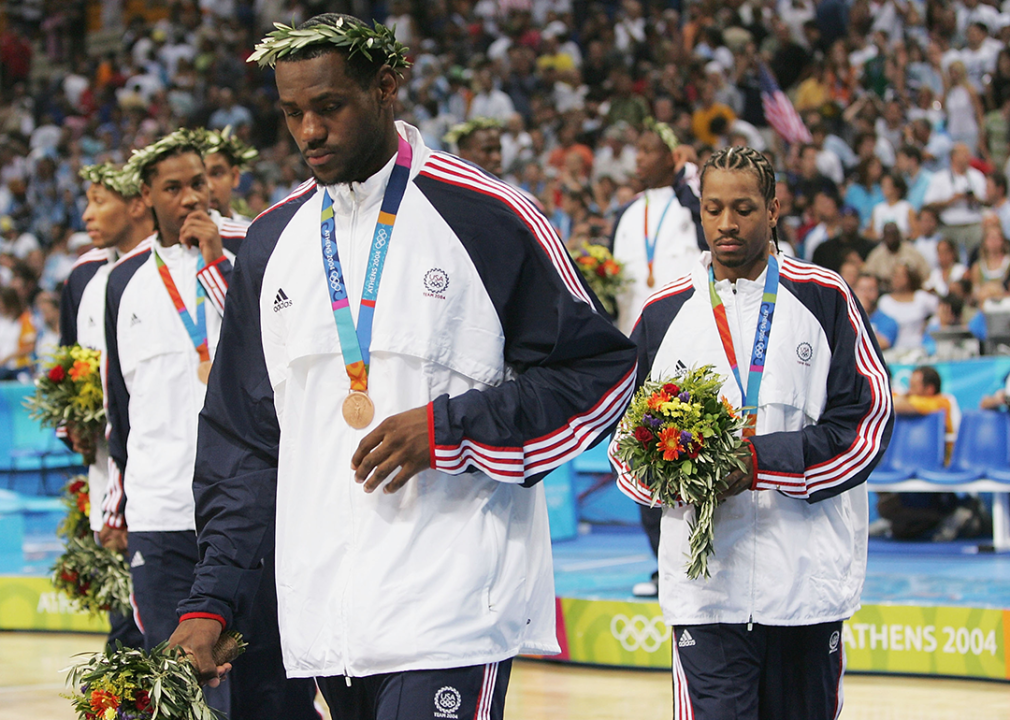
In 1989, basketball's international federation changed its rules to allow professionals to play in the 1992 Barcelona Olympics, a move that created the "Dream Team" from the United States, perhaps the greatest basketball team ever, which dominated the tournament.
Subsequent iterations also won gold at the next two Olympics, but in Athens, they were anything but a dream. The warning signs were apparent from the get-go when the team lost its first game—and just third in U.S. men's Olympic history—to Puerto Rico 92-73. Another group stage loss to Lithuania 94-90 embarrassed the team, which included Allen Iverson, Stephon Marbury, Tim Duncan, LeBron James, Carmelo Anthony, and Dwyane Wade, as well as Vince Carter, a late replacement for an injured Kobe Bryant, who was also dealing with legal issues.
Although the lineup looked good on paper, James, Anthony, and Wade were still young players and didn't have much—if any—international experience. The U.S. managed to get out of the group stage and win its quarterfinal match, but Argentina outplayed them in the semifinals, winning 89-81, in the team's journey to the top of the podium. Winning bronze wasn't a shoo-in—the U.S. had a rematch with Lithuania for the bronze, but this time they managed to get the victory, 104-96.
Four years later, James and Wade were back on a squad that now included Bryant, who captained the squad. Nicknamed the "Redeem Team," they avenged their performance in Athens by taking the gold.
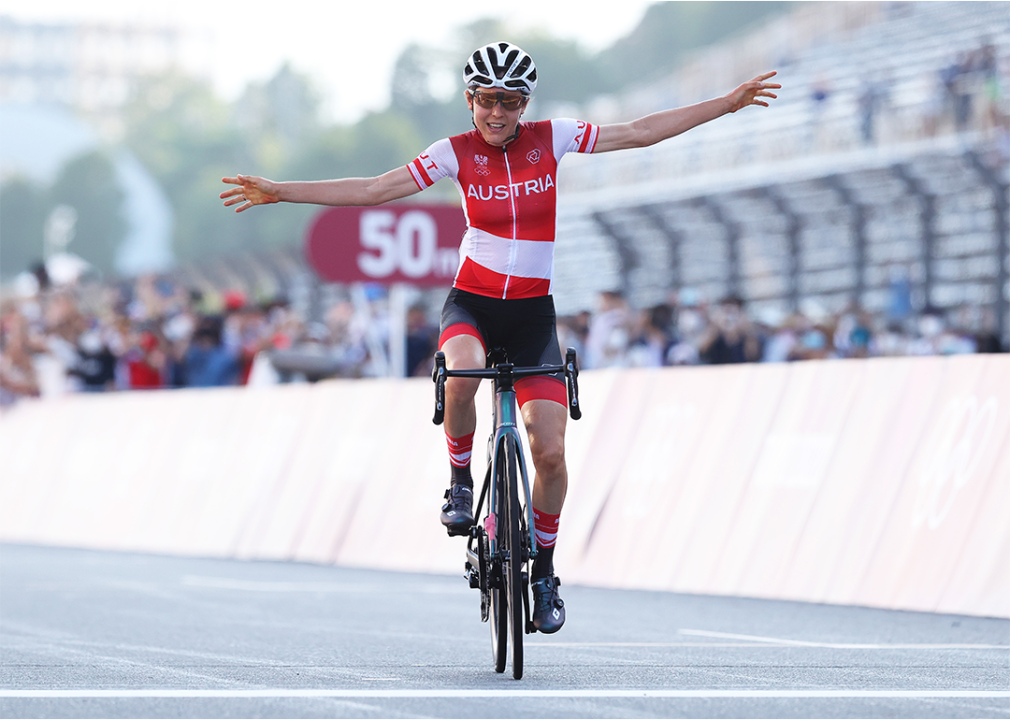
At the 2016 Rio Olympics, Dutch cyclist Annemiek van Vleuten was leading the women's road cycling event. With 10 kilometers left in the race, rain started to fall, and on a steep, windy descent, van Vleuten slid on the wet pavement, crashed, and went over her handlebars, suffering a concussion and three spinal fractures.
Four years later, she and her teammate, defending gold medalist Anna van der Breggen went into the 2020 Tokyo Olympics as the favorites. Although van Vleuten crashed with about 66 kilometers left in the race, she rallied to get to the front of the peloton and, with about 2 kilometers left, surged ahead and stayed there until she crossed the finish, arms raised in victory. Except she hadn't won.
Over a minute beforehand, Austria's Anna Kiesenhofer crossed the finish line, having ridden alone for a good portion of the race. Kiesenhofer, who holds a doctorate in mathematics, was not well-known on the pro circuit, had been part of a breakaway group that attacked very early on and got far ahead of the peloton. Although the other riders in this group slowly got drawn back into the peloton, everyone lost track of Kiesenhofer, a fact compounded by a rule that teams cannot use radios at the Olympics to communicate other riders' whereabouts.
Although van Vleuten was disappointed, she avenged her loss by taking gold in the cycling time trial three days later.
Story editing by Carren Jao. Additional editing by Kelly Glass. Copy editing by Tim Bruns.
This story originally appeared on ATS.IO and was produced and distributed in partnership with Stacker Studio.